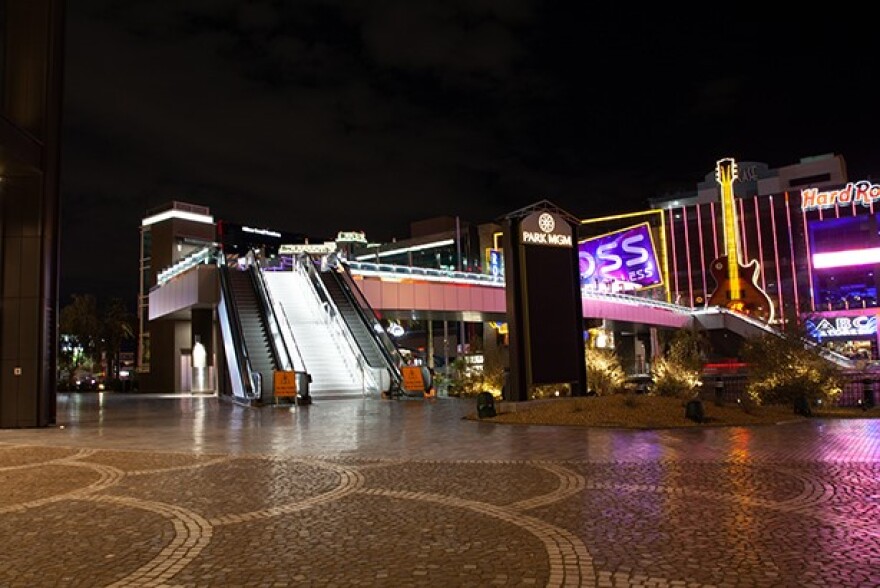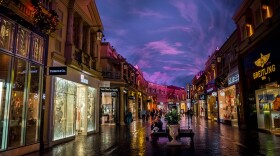Earlier this week, Mayor Carolyn Goodman publicly begged the governor to lift business restrictions on non-essential businesses.
And growth in the number of COVID-19 cases DOES seem to be slowing down. Of course, that’s also because people are self-isolating.
So given the choice: Does Nevada keep isolating to keep the rate down? Or does it open businesses hoping the virus has passed?
John Restrepo is the principal at RCG Economics. He has been monitoring and consulting on Nevada's economy for several years, including during 9/11 and the Great Recession.
He said the economic downturn because of the virus is the worst he's seen. The job gains the valley had during the 10 years since the Great Recession have been wiped out in just a few weeks since non-essential businesses were shut down, Restrepo said.
However, while the economic impact has been devastating, Restrepo believes Gov. Sisolak did the right thing.
"I think the worst thing we could do is reopen prematurely and then have another wave of the virus, which a lot of scientists say could happen in fall through the spring of next year, another smaller wave," he said, "And then we shut down again. The message that that sends to consumers and to travelers is pretty dire."
He said the state needs to get the medical pandemic under control first because the economic pandemic could actually be worse.
Restrepo also said the country needs to ramp up testing for the virus so we can know how wide-spread it is before we can talk about reopening anything.
When the state can reopen, he believes it needs to planned and gradual.
"It's going to be a long slog and it's going to happen over multiple phases of a recovery," he said.
Plus, he believes there will be big changes in how things are done in the hospitality industry because of the virus and the lockdown.
Roger Gros is the publisher of the Global Gaming Business magazine. He agreed that the reopening - when it does happen - will be gradual. And some of the sights Las Vegas is used to, like crowded gaming tables on a busy night, won't happen.
"You could open the casinos in stages," he said, "Probably the locals' casinos first. I don't think we would want a lot of the tourists coming back immediately but you can open the locals' casinos first under social distancing regulations."
He suggested the casinos might turn off every third slot machine and only let a few people sit at gaming tables. But when you have so few players at a table, it brings up the problem of staffing and whether it makes sense to keep a full staff for a few players at a time.
Gros also believes the resorts will be forced to make changes to how they operate. Over the past few years, Las Vegas resorts have been criticized for ever-increasing fees for everything from parking to drinks.
Gros thinks to get the Strip back up and running resorts might have to go back to being value destination.
"I think there is a real opportunity for Las Vegas to reinvent itself by eliminating the resort fees and parking fees and the drink fees and lowering the prices on everything because it's going to be a new economic model when this thing is over," he said.
After the Great Recession, leaders around the state knew it was important to diversify the economy and bring business that could better weather economic storms like the global financial crisis.
Robert Lang, a professor of public policy at UNLV and executive director of Brookings Mountain West and the Lincy Institute worked with the state on exactly how to do that.
He said diversification continues to be a problem. The region is dominated not only by the tourism industry but by industries that service the gaming and tourism industry, Lang said.
"We've actually diversified the economy but at the same time even some of the things that look like successes when you look at the numbers and it looks like there is less people in gaming, it's that it's ancillary. It is something that relies on it," he said.
Lang noted that Southern Nevada is very competitive when it comes to all kinds of industries like entertainment and conventions but those are all face-to-face services.
Looking forward to when the economy is back up and running, he thinks Nevada needs to work on bringing manufacturing, health care and data services to the state.
Plus, he would like to see investments in transportation.
"One of the things we could do, if the federal government is going to want a lot of stimulus in infrastructure, is to begin to develop transit systems in Las Vegas," he said, "It was something that was a deficiency from this last burst of activity."
He said the city has built a lot of infrastructure for tourism but now we could plan to build better ways to get tourists to that infrastructure. Lang pointed out that during the recession the Obama administration gave money to shovel-ready projects to help boost the economy and the Trump administration might do the same thing and Nevada needs to be ready.
Roger Gros, publisher, Global Gaming Business magazine; Robert Lang, UNLV professor, executive director of Lincy Institute and Brookings Mountain West; John Restrepo, economist, principal at RCG Economics










